
Forests and Landscape Restoration/ Restorasi Hutan dan Bentang Lahan (RENTANG)
Inspiring, enabling and implementing restoration on degraded and deforested landscapes, enhancing their economic and environmental productivity.
Inspiring, enabling and implementing restoration on degraded and deforested landscapes, enhancing their economic and environmental productivity.
Aim
WRI Indonesia aims to support a major national initiative to reclassify these million hectares of lands and forests into more accurate statuses that allow productivity while protecting the remaining forests through conservation and restoration activities to enhance economic and environmental productivity.
Where
Jambi and South Sumatra
Why
Recent official data shows that Indonesia has 29 million hectares of non-forested land under ‘forest estate’ legal zoning and 15 million hectares of forested land classified as ‘non-forest estate’. This statistics demonstrates a prevailing challenge of enabling greener growth and rational land-use planning. For example, the non-forested area under forest estate can be afforested or swapped with forested area under non forest estate and utilized for agricultural production or agro-forestry. Meanwhile, the latter can be conserved to protect its valuable biodiversity and function as a carbon sink.
Given the current administration’s food sovereignty vision, 2020 biofuel target, as well as social forestry target, it is absolutely necessary to support these efforts with the tools that would enable the achievement of optimized land use, including through utilization of its vast extent of degraded and deforested lands.
Restoring lost forests and degraded lands is essential for human livelihoods and well-being, long-term food security, climate stability, and biodiversity conservation. In order to counteract land degradation and to improve livelihoods, we need to restore forests and increase the productivity of existing agricultural land at the same time. Only then can we create carbon intensive landscapes that are also diverse, productive, and resilient.
How
WRI and the International Union for Conservation of Nature developed the Restoration Opportunity Assessment Methodology (ROAM), a tool that can be utilized to execute the best possible scenario in maximizing land use in Indonesia. ROAM can deliver identified priority areas for restoration, relevant and feasible restoration interventions, quantified costs and benefits of each intervention type, estimated values of carbon sequestered by these intervention types, analysis of the finance and investment options for restoration and a diagnostic of ‘restoration readiness’ and strategies for addressing major policy and institutional bottlenecks.
The Initiative’s outcomes will contribute to the Bonn Challenge, an aspiration to restore 150 million hectares of the world's deforested and degraded lands by 2020.